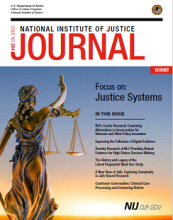Reentry Research at NIJ: Providing Robust Evidence for High-Stakes Decision-Making
Journal
NIJ Journal
Date Published
April 2022
Agencies
NIJ
Publication Type
Research (Applied/Empirical)




